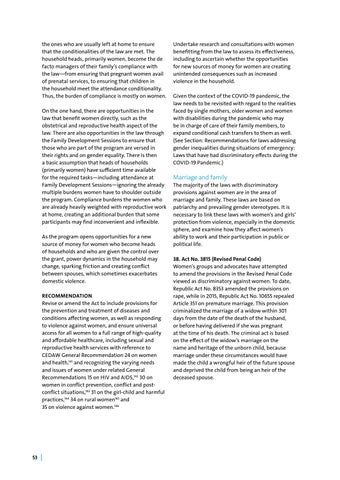the ones who are usually left at home to ensure that the conditionalities of the law are met. The household heads, primarily women, become the de facto managers of their family’s compliance with the law—from ensuring that pregnant women avail of prenatal services, to ensuring that children in the household meet the attendance conditionality. Thus, the burden of compliance is mostly on women. On the one hand, there are opportunities in the law that benefit women directly, such as the obstetrical and reproductive health aspect of the law. There are also opportunities in the law through the Family Development Sessions to ensure that those who are part of the program are versed in their rights and on gender equality. There is then a basic assumption that heads of households (primarily women) have sufficient time available for the required tasks—including attendance at Family Development Sessions—ignoring the already multiple burdens women have to shoulder outside the program. Compliance burdens the women who are already heavily weighted with reproductive work at home, creating an additional burden that some participants may find inconvenient and inflexible. As the program opens opportunities for a new source of money for women who become heads of households and who are given the control over the grant, power dynamics in the household may change, sparking friction and creating conflict between spouses, which sometimes exacerbates domestic violence. RECOMMENDATION Revise or amend the Act to include provisions for the prevention and treatment of diseases and conditions affecting women, as well as responding to violence against women, and ensure universal access for all women to a full range of high-quality and affordable healthcare, including sexual and reproductive health services with reference to CEDAW General Recommendation 24 on women and health,141 and recognizing the varying needs and issues of women under related General Recommendations 15 on HIV and AIDS,142 30 on women in conflict prevention, conflict and postconflict situations,143 31 on the girl-child and harmful practices,144 34 on rural women145 and 35 on violence against women.146
53
|
Undertake research and consultations with women benefitting from the law to assess its effectiveness, including to ascertain whether the opportunities for new sources of money for women are creating unintended consequences such as increased violence in the household. Given the context of the COVID-19 pandemic, the law needs to be revisited with regard to the realities faced by single mothers, older women and women with disabilities during the pandemic who may be in charge of care of their family members, to expand conditional cash transfers to them as well. (See Section: Recommendations for laws addressing gender inequalities during situations of emergency: Laws that have had discriminatory effects during the COVID-19 Pandemic.)
Marriage and family The majority of the laws with discriminatory provisions against women are in the area of marriage and family. These laws are based on patriarchy and prevailing gender stereotypes. It is necessary to link these laws with women’s and girls’ protection from violence, especially in the domestic sphere, and examine how they affect women’s ability to work and their participation in public or political life. 38. Act No. 3815 (Revised Penal Code) Women’s groups and advocates have attempted to amend the provisions in the Revised Penal Code viewed as discriminatory against women. To date, Republic Act No. 8353 amended the provisions on rape, while in 2015, Republic Act No. 10655 repealed Article 351 on premature marriage. This provision criminalized the marriage of a widow within 301 days from the date of the death of the husband, or before having delivered if she was pregnant at the time of his death. The criminal act is based on the effect of the widow’s marriage on the name and heritage of the unborn child, because marriage under these circumstances would have made the child a wrongful heir of the future spouse and deprived the child from being an heir of the deceased spouse.

